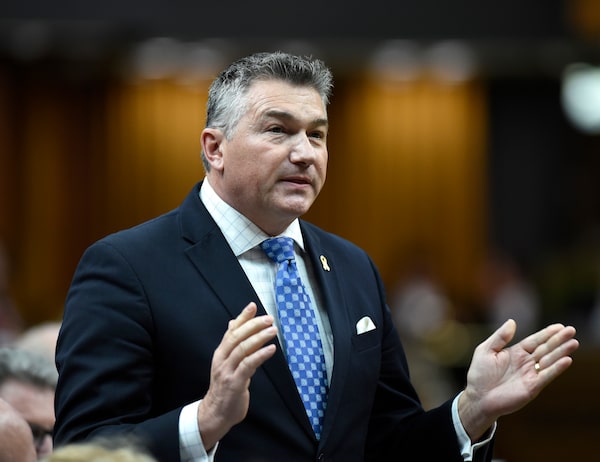
Conservative MP James Bezan, seen here during Question Period on May 16, 2019, says the party doesn't want to 'fan those flames' of Western alienation any further.Justin Tang/The Canadian Press
Veteran Conservative MPs from Western Canada say the next leader of their party should unite the country’s regions, and not stoke the flames of provincial resentment.
The federal Conservatives dominated the Prairies in the fall federal election, winning every seat in Saskatchewan, and all but one in Alberta. While the Tories saw significant gains in Western Canada, some Conservative members of Parliament were irked by outgoing Leader Andrew Scheer’s inability to attract more support outside the region.
Manitoba MP James Bezan said it does not matter where the next leader of the Conservative Party is from, but that he’s been fielding phone calls from people who are considering a leadership run, and he primarily asks them about how they would unite the different factions of the party.
“It’s starting to calm down out here a little bit, but we don’t want to do anything that fans those flames any further. It’s beyond Western alienation now, this is Western separatism,” said Mr. Bezan, adding that he even hears about it in rural Manitoba.
“We have to be very careful in making sure that the leader we choose is one that is palatable right across the country, so as much as we are all wanting to make inroads in urban Canada, we have to make sure that we don’t bring forward ideas that will turn off our supporters in Western Canada,” he added.
The majority of potential candidates who have indicated interest in running are from Ontario and Quebec, but most are waiting for the party’s leadership organizing committee to release the rules of the race – such as how much money candidates need to raise and how many signatures to gather – before officially declaring their candidacy.
Marilyn Gladu, Conservative MP for the Ontario riding Sarnia-Lambton, announced her candidacy on Thursday, saying in a statement that Conservatives “need to win the next election. To do that, we need to expand the base.”
Ontario Conservative MPs Erin O’Toole and Pierre Poilievre have been preparing leadership campaigns, but have not formally entered the race.
Alberta MP Michael Cooper said party members in his riding tell him they want to see “someone who can win.” Mr. Cooper said he is looking for a leader who has a thorough understanding of policy, can manage caucus effectively and who is perfectly bilingual, among other qualities. Mr. Cooper said he hopes Mr. Poilievre runs for the position.
Michael Fortier, a former Conservative senator and minister, had been mulling a leadership bid, but has come to the conclusion that he does not have a path to victory. Still, he said the Conservative Party needs to make it clear that even backbenchers will not be able to reopen the abortion debate.
“The leadership race will require not only a clash of ideas, but also a clash of values,” he said in a statement.
Now vice-chairman at RBC Capital Markets, Mr. Fortier called on the party to “get rid of its radical elements” and adopt policies that appeal to urban voters, including a carbon tax. For now, he said, Conservatives seem like global-warming skeptics in the eyes of too many Canadians.
While Mr. Fortier is bowing out of the race, other potential candidates are getting ready for a campaign launch.
Jean Charest, the former leader of the Progressive Conservative Party and ex-Quebec premier, is planning on announcing his intentions within two weeks. A member of Mr. Charest’s team confirmed that it’s working in Ontario with high-profile organizer Nick Kouvalis. Mr. Kouvalis worked on Kellie Leitch’s controversial bid for the Conservative leadership in 2017, as well as past campaigns of Toronto Mayor John Tory and former mayor Rob Ford.
Former Conservative cabinet ministers Rona Ambrose and Peter MacKay have yet to announce their leadership intentions, but both are said to be considering entering the race.
British Columbia MP Ed Fast said he is also looking for a leader that will unite the party, but also one who sees the big picture.
“We have regional divides, we have divides between social conservatives and progressives, I want to make sure our Conservative Party remains united so that we are a viable option to the Trudeau government in the next election,” Mr. Fast said. He added that some within the party “are suggesting it’s time for someone from east of Manitoba to become leader.”
Jamie Ellerton, principal at Conaptus, and formerly manager of media relations on Mr. Scheer’s election campaign tour, agreed that it doesn’t matter where the leader is from, but that they connect with all regions of the country “especially those that are vote-rich.”
“I don’t think a leader has to come from Ontario, but a leader has to demonstrate in a meaningful way that they can win over the existing support of Conservative members in Ontario,” he said. On the other hand, he added, if the next leader is from outside Western Canada, they cannot take that region for granted.
With a report from Daniel Leblanc